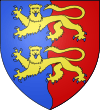Manche
| Manche | |||
|---|---|---|---|
| Department | |||
|
Prefecture building of the Manche department, in Saint-Lô | |||
| |||
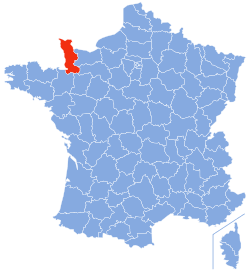 Location of Manche in France | |||
| Coordinates: 49°03′N 01°15′E / 49.050°N 1.250°ECoordinates: 49°03′N 01°15′E / 49.050°N 1.250°E | |||
| Country | France | ||
| Region | Normandy | ||
| Prefecture | Saint-Lô | ||
| Subprefectures |
Avranches Cherbourg-Octeville Coutances | ||
| Government | |||
| • President of the General Council | Jean-François Le Grand | ||
| Area1 | |||
| • Total | 5,938 km2 (2,293 sq mi) | ||
| Population (20137) | |||
| • Total | 499,919 | ||
| • Rank | 52nd | ||
| • Density | 84/km2 (220/sq mi) | ||
| Time zone | CET (UTC+1) | ||
| • Summer (DST) | CEST (UTC+2) | ||
| Department number | 50 | ||
| Arrondissements | 4 | ||
| Cantons | 27 | ||
| Communes | 516 | ||
| ^1 French Land Register data, which exclude estuaries, and lakes, ponds, and glaciers larger than 1 km2 | |||
Manche (French pronunciation: [mɑ̃ʃ]) is a French department in Normandy (Normandie), named for the English Channel, which is known as La Manche, literally "the sleeve", in French, that borders its north and west shores and part of its east shore.
History
Manche is one of the original 83 departments created during the French Revolution on March 4, 1790. It was created from part of the province of Normandie.
The first capital was Coutances until 1796, and it resumed that role after World War II because of the almost complete destruction of Saint-Lô during the battle of Normandy following D-Day. When Saint-Lô was rebuilt, it again became the capital.
Geography
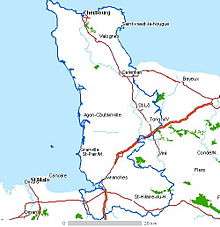
The Department includes the Cotentin Peninsula down to the famous Mont St Michel; though of the off-shore Channel Islands only Chausey forms part of the territory of the department.
Manche borders the Normandy departments of Calvados to the east and Orne to the southeast. Mayenne, a department of the Pays de la Loire, is to the south-east, and Ille-et-Vilaine in Brittany is to the south-west.
The region is lush and green with sandy beaches, remaining very rural and farming oriented. The peninsula was originally joined as a single land mass to Cornwall and Dorset in England, meaning that the underlying countrysides of both are very similar - although as farming practices have varied considerably between the UK and France, there are substantial regional differences today in terms of flora and fauna. Flat marsh areas in the department are known for their bird watching. The region and around St Lo is also the horse capital of France, where the cooler climate compared to the south is ideal for breeding and training.
France's first EPR reactor is near completion at Cherbourg and the TGV fast trains are planned for Paris to Caen and Cherbourg for 2020.
Climate
The climate is oceanic, with relatively mild winters temperatures can go below zero for a few days occasionally. Temperate summers, around 20 °C, can occasionally reach 35 °C in direct sun light. Precipitation is substantial, and varies greatly by region, between 700mm on the coast and 1300mm in the southern central area. Highly localised, not life-threatening flash flooding has been experienced over the last few years in the spring period.
The west coast benefits from the Gulf stream's influence, allowing the naturalization of many Mediterranean and exotic plants (mimosas, palms, agaves...).
There is often a sea breeze on the coast, which combined with tides contributes to quick temperature changes over a single day. Sea temperatures can be very pleasant for swimming between July and October.
Demographics
Inhabitants of the department are called Manchots or Manchois.
Sports
.jpg)
- Football: main clubs: AS Cherbourg, US Avranches, Saint-Lô, Granville, Villedieu, UST Équeurdreville-Hainneville...
- Cycling: the Tour de France has visited the department 21 times with stages ending at Cherbourg (16), Avranches (2), Granville (1), Saint-Hilaire-du-Harcouët (1), and the Mont Saint-Michel (1).
- Sailing: the Solitaire du Figaro has come to Cherbourg several times.
- Thai boxing: Villedieu-les-Poêles
- Badminton: Two local clubs compete in the national championship (N3): St Hilaire du Harcouet and Hainneville.
- Golf: course: Granville, Bréhal, Coutainville, Cherbourg, Centre Manche, Fontenay, Côte des Isles
Tourism

- Chausey islands
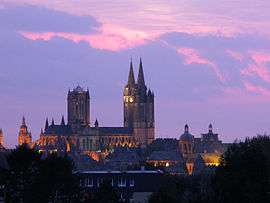
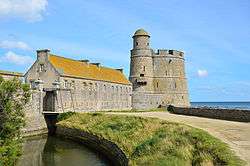
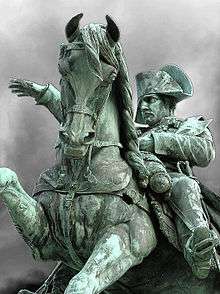
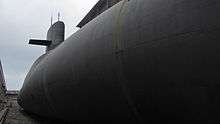
 A vestige of the Normandy landings in Utah Beach
A vestige of the Normandy landings in Utah Beach
See also
- Cantons of the Manche department
- Communes of the Manche department
- Arrondissements of the Manche department
- Cotentinais, the Norman dialect of Manche.
External links
| Wikimedia Commons has media related to Manche. |
| Wikisource has the text of an 1879 American Cyclopædia article about Manche. |
- (French) Prefecture website
- (French) General Council website
- (English) Manche at DMOZ
- (French) A whole wiki about the Manche !
- (French) Comité départemental du tourisme de la Manche

